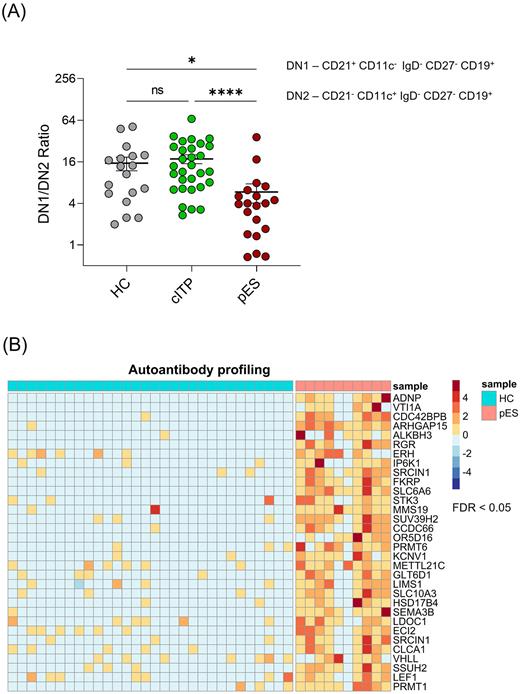Abstract

Introduction: Pediatric Evans Syndrome (pES) is a rare autoimmune disorder characterized mainly with the co-occurrence of autoimmune hemolytic anemia and immune thrombocytopenia. Although around 40% of patients with pES have known genetic variants associated with inborn errors in immunity (IEI), the underlying immune anomalies especially B cell dysregulation are poorly understood. In our recent study, when compared to single lineage cytopenia such as chronic immune thrombocytopenia (cITP), we showed that patients with pES are characterized by abnormal expansion of circulating T-follicular helper cells (cTfh), increased T-cell activation, decreased naïve CD4+ T as well as class-switched memory B (CSMB) cells (Kumar et al., Blood 2022). Despite our improved understanding of T-cell immune abnormalities in pES, the underlying B-cell dysfunction is largely undefined. To further understand the unique immune pathologies in pES and cITP, we evaluated B cell defects in these patients.
Methods: Over a period of 2017-2022, we enrolled 20 patients with pES, 30 patients with cITP and 18 healthy controls (HCs). Seven out of 20 patients with pES had known pathogenic genetic variants associated with IEI. Patients with high ANA titer (≥ 1:320) with lupus like features were excluded from cITP cohort. High dimensional flow cytometry was performed to to evaluate B-cell maturation and activation, features of extrafollicular B cell development, and autoreactivity. Multiplex cytokine profiling was performed to evaluate the differences in underlying inflammatory milieu in these patient cohorts. To assess the unique disease defining autoantibodies in pES, IgG and IgA autoantibody profiling was performed using HuProt human protein microarrays and autoantibodies were screened against >21,000 unique human proteins or protein fragments.
Results: We observed that patients with pES have significantly higher proportion of CD10+ immature/transitional B cells in comparison to cITP and HCs. Despite an expansion of cTfh and elevated levels of plasma CXCL13 (a key homing chemokine for B cells and cTfh cells and a biomarker of germinal center reaction) and comparable IL-21 levels to HCs, we observed low a frequency of CSMB in pES which suggests underlying defects in B-cell maturation. While canonical B-cell maturation is defective in patients with pES, we noticed that patients with pES have aberrant extrafollicular B-cell development characterized by significant higher proportion of DN2 (CD11c+CD21-) and decreased proportion of DN1 (CD21+ CD11c-) populations when compared to both cITP and HCs. (Figure A). However, the frequency of parent population i.e., double negative (DN) (IgD- CD27-) B-cells was similar across the cohorts. In support of these observations, we also noted decrease in CXCR5+ expressing B cells in 30% of patients with pES which is critical for lymph node homing. In addition to increase in extra-follicular B-cell development, we also noted increase in autoreactivity in B cells in patients with pES as evident by significant expansion of autoreactive 9G4+ B cells. To further assess auto-antibody driven pathophysiology in pES, we evaluated the auto-antibody repertoire in plasma samples and found that patients with pES have a broad repertoire of autoantibodies targeting several cellular processes and against several different tissue types not restricted to hematopoietic lineage (Figure B). Further studies are ongoing to validate and establish the significance of these autoantibodies in disease pathophysiology.
Conclusions: Taken together, our findings have identified broad B-cell immune abnormalities and a unique auto-antibody repertoire in patients with pES. In addition to expanding our understanding of the disease pathology, the utility of these immune findings in disease response evaluation and monitoring needs to be further evaluated.
Disclosures
Chandrakasan:Sobi, Inc.: Consultancy.
Author notes
 This icon denotes a clinically relevant abstract
This icon denotes a clinically relevant abstract
Asterisk with author names denotes non-ASH members.


This feature is available to Subscribers Only
Sign In or Create an Account Close Modal